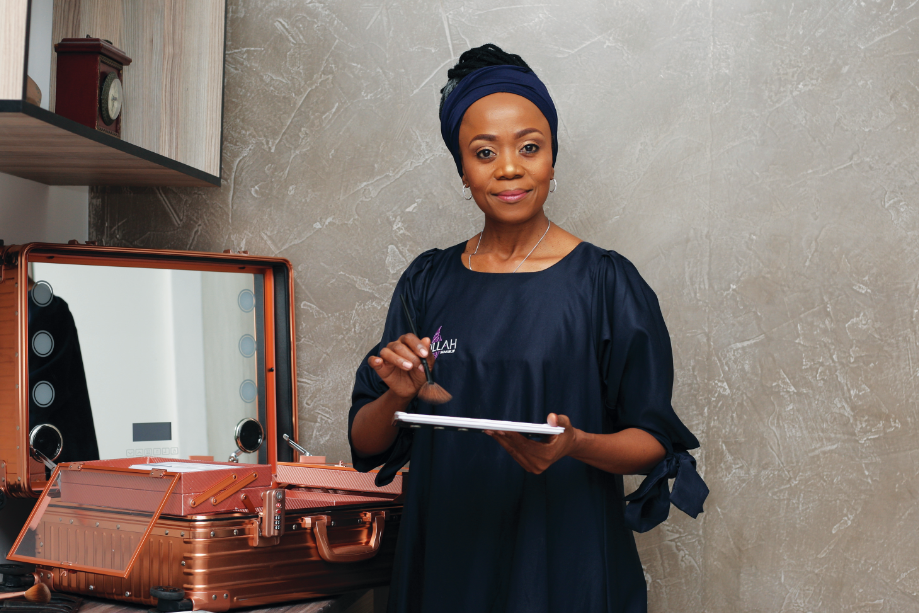As a teenager, Mabel Ledwaba turned her bedroom into a beauty parlor. Today, her brand has made a mark on the local beauty industry.
An 83km drive to the industrialized Vanderbijlpark in the southern parts of Johannesburg presents an undulating green and brown landscape.
In the midst of all the dullness, we are greeted on arrival by a well-groomed beauty entrepreneur in this town in South Africa’s Highveld.
Like an Egyptian goddess, make-up artist Mabel Ledwaba glides in, in a full-length, draped black dress, and recollects her entrepreneurial journey.
“It was a long ten years of trial and error,” says Ledwaba, arching her well-shaped brows.
Ledwaba, who initially planned on opening a nail and eyelash bar, founded a make-up line that is today worth over R2.5 million ($181,000), and has a presence in all nine provinces of South Africa.

The transition from employee to employer took six months before Havillah Beauty officially launched in 2008.
In just two years, the business grew from occupying 20 square meters to a 50-square meter establishment in a commercial office space.
“You can have a business plan but you never stick to it,” Ledwaba says.
Tapping into a market at a time when international cosmetics dominated in South Africa, Ledwaba was determined to make a mark as a local brand.
With a dream and passion for business, as a teenager, the township beauty queen converted her bedroom into a beauty parlor.
The informal business operated from Monday to Saturday when she would return from school, without extra time for social activities.
“You prepare them [clients] to go see their boyfriends and to go to the clubs. It kept me out of mischief,” she says.
As her popularity grew throughout her community, she took her talent beyond the streets, and she pursued a qualification in cosmetology. She also honed her talent for hair-dressing, infusing a local feel to different hair textures and styles.
“I gave them that township feel of doing hair in a white salon. I remember I was the highest paid because everyone got paid on commission, and everybody wanted me to do their hair. That, as well, taught me business skills. I saw the professional side,” she says.
With a starting capital of R80,000 ($5,700) that she received from her husband, she never looked back.
Importing the make-up products from Germany, Ledwaba mixes the powder pigments to cater for the African market.
“Reach out in aggressive marketing; reach out in terms of being aggressive where you make sure they feel and they touch the product. They will not buy the product based on trust, they will buy it because you have given them enough proof that it works. An international brand, they buy on trust but with us, they buy based on proven facts, so we have to do double the work,” she says.
“We do not manufacture from scratch, but we are mainly responsible for the colors we mix. We have a supplier in Germany, who supplies other brands. We tell them to mix the colors in a specific way so that we have our colors,” she adds.
READ MORE | Businesses Of The Future: 20 New Wealth Creators On The African Continent
Testing the market in a Johannesburg mall paved the way for business development and strategies.
Online and pop-up stores propelled the brand into a competitive market.
In a market research report on the cosmetics industry in South Africa 2017, published by ReportLinker, “the value of the sector, which includes the manufacture of cosmetics, perfumes and other personal care preparations, is estimated to have grown to R27.35 billion at retail level and R19.69 billion at manufacturing level”.
“What feeling do you get when you see somebody you have applied make-up on and their face just shines,” asks Ledwaba as she turns the mirror in our direction.
She also imparts her know-how to other aspirants in the industry, adding value to the skills of young people.
Makgotso Mpalakanye, a 22-year-old make-up artist who works on South African soapie Generations The Legacy, had completed a course at Havillah Beauty.
“I started doing make-up at a young age, and I took it seriously at the age of 20. I was lucky to find a lady who took me to school and paid my fees,” Mpalakanye says, who now has an academic understanding of the beauty industry.
“It helps you improve and know different make-up types,” she attests.
As Ledwaba’s business continues to grow, her determination to develop a culture of entrepreneurship in the make-up industry is showing no signs of fading away.
